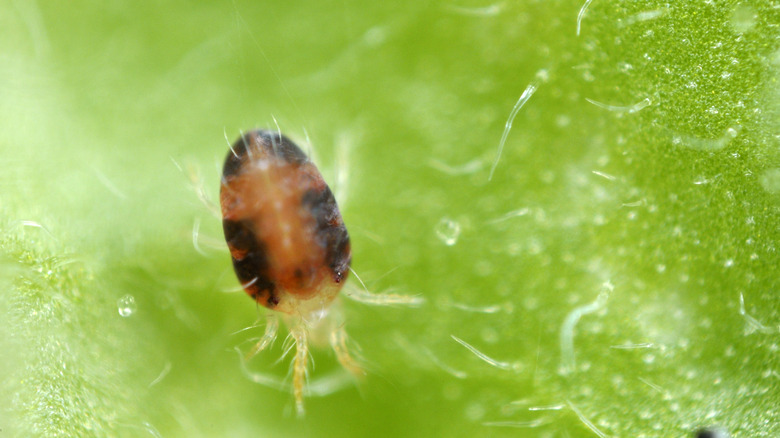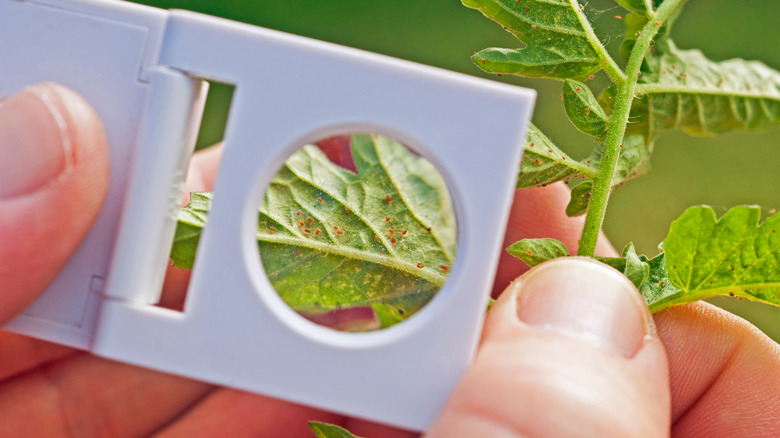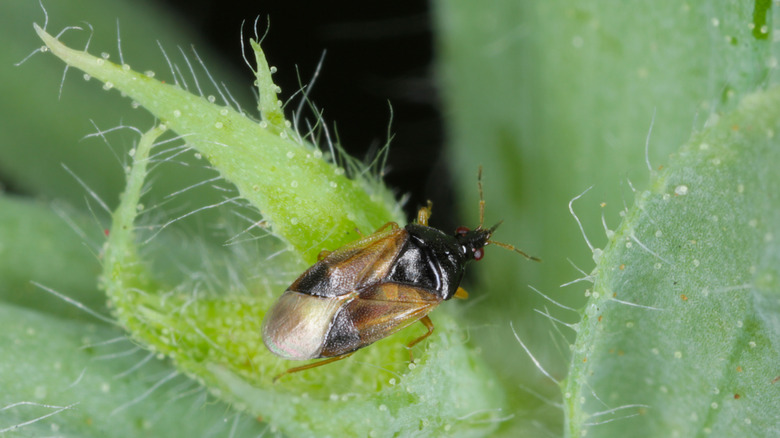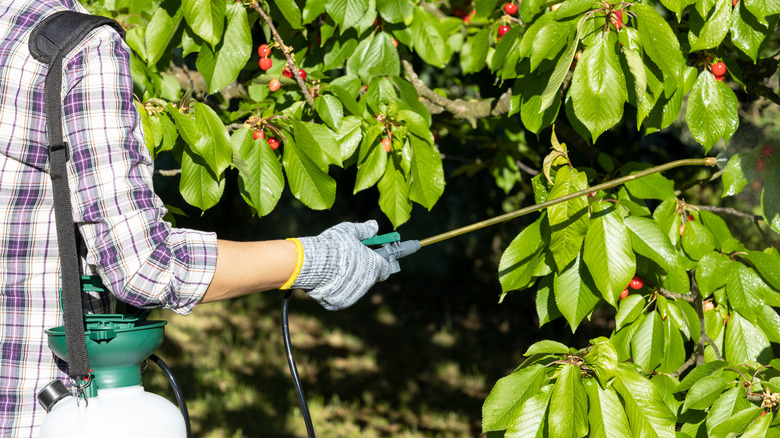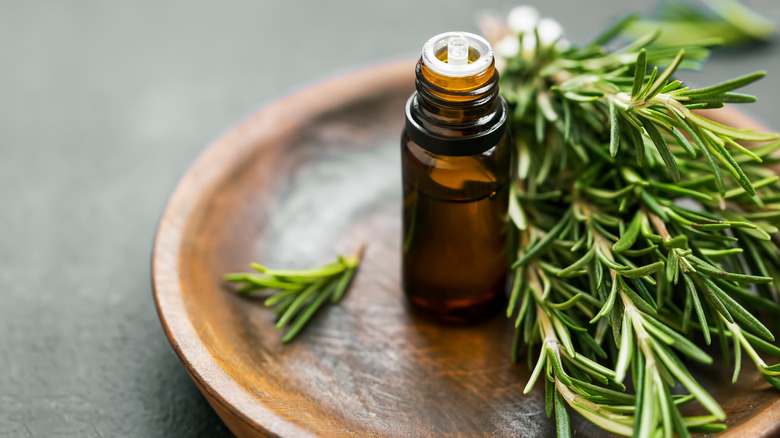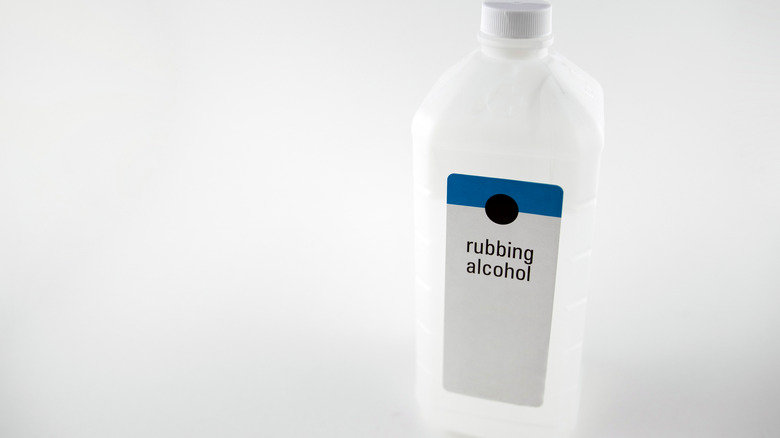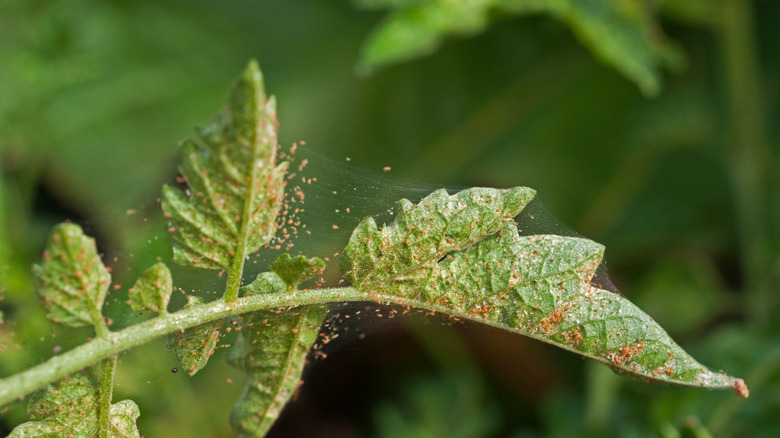8 Best Ways To Get Rid Of Spider Mites
A backyard can be a delight for homeowners. Your wonderful garden can lure beautiful creatures such as butterflies and hummingbirds, making them a welcome sight to see when you sip your first cup of Joe in the morning. Unfortunately, it can also attract some not-so-welcoming pests. Some nuisances that do the most damage to your precious plants, perennials, and vegetables include green worms that infiltrate your rose bushes, voles that love plant roots, and spider mites that are so tiny you might miss them. Spider mites can be particularly pesky since an infestation can kill your entire plant, but they're relatively easy to get rid of if you catch them quickly.
A quick way to catch a spider mite infestation is to look for speckling on your plants. "An early symptom associated with spider mite damage is referred to a 'stippling' and/or 'speckling' because spider mites feed on the chlorophyll of plants, thus removing the green content," said Raymond Cloyd, a Kansas State University Research and Extension specialist in horticultural entomology. It is crucial to know what to look for so you can rid them from your garden. Here are the 8 best ways to eradicate spider mites from your beautiful garden.
1. Prevention
We love prevention at House Digest because if you can actively take steps to avoid an issue, we are all for it! It's genuinely one of the best ways to prevent an infestation of any kind, whether you're dealing with house centipedes, problematic grasshoppers, or crickets. While those bugs are easy to spot, spider mites are a little trickier because they are smaller than a millimeter. Bob Vila suggests getting a magnifying glass to inspect your plants and then performing what is known as the "white paper test," which requires you to put a white piece of paper beneath a plant's leaves as you give it a good shake. If any spider mites fall on the paper, you know you have an issue.
LawnStarter says to perform this test while at a nursery before bringing new plants into your existing garden. Doing this test can prevent an infestation before introducing new plants to your garden.
2. Natural predators
Attracting spider mites' natural predators to your garden is an excellent way to get rid of your annoying pests. According to the University of California's Agriculture and Natural Resources Department, attracting predatory mites, thrips, lacewings, and minute pirate bugs is a critical step in controlling a spider mites infestation. However, it is essential to note that this brilliant idea won't work if you plan to use pesticides on your plants.
If you're wondering how to lure green lacewings to your garden, Bob Vila says you can buy them as eggs, larvae, and adults on websites like GreenMethods.com. Another bug that will naturally eliminate spider mites in your garden is the minute pirate bug, which you can purchase at Buglogical, a pest management company focused on biological control. Not only do these bugs eat spider mites, but they also prey on aphids, insect eggs, leafhoppers, psyllids, whiteflies, and caterpillars.
3. Insecticidal soap
Insecticidal soap is a non-toxic spider mite remedy made from potassium salts of fatty acids, according to The Spruce. It is an excellent insecticide for those who do not want to harm their plants with chemical sprays. And bonus: Insecticidal soap can also eliminate aphids and whiteflies.
Insecticidal soap is very easy to buy. Apartment Therapy points out you can shop various brands at most home improvement stores or nurseries, which is handy since you want to alternate between at least two different brands. "Mix up the product you're spraying so that the spider mites won't build up an immunity to it," horticulturist Justin Hancock at Costa Farms told Apartment Therapy. You can also make a homemade version if you have a penchant for DIY mixtures, consisting of up to 5 tablespoons of soap mixed with 1 gallon of water (via Horticulture Magazine). This is a highly effective method for killing spider mites.
4. Essential oils
You might love using essential oils to make your home smell cozy and inviting, but did you know you can also use some of your favorite oils to ward off spider mites? According to Bob Vila, you can make a homemade essential oil spray to ward off the annoying pests. The outlet suggests mixing 1 quart of tap water with 1 teaspoon of lemon-scented dish soap with 1/2 ounce of rosemary essential oil to create the spray. You will then add this to a bottle, shake the ingredients together, and spray your plants to eliminate the mites.
But that's not the only recipe out there, so if that doesn't get the job done, you can try another essential oil spray. LawnStarter advises using a mixture of rosemary essential oil, spearmint, coriander, and chamomile to repel spider mites away from your favorite plants. The company also notes that neem oil would make a great option, as it suffocates spider mites.
5. Hot peppers
Having hot peppers around can be a Godsend not just for making spicy salsa but also for protecting your garden. Spider mites detest hot peppers, making them a potent bug repellent. If you want to keep your vegetable and house plants thriving, SF Gate suggests mixing 1 teaspoon of your favorite hot sauce with 1 quart of lukewarm water and a couple of squirts of liquid dish detergent. Let the mixture rest through the night, and then pour it into a spray bottle. Shake the ingredients together, and then spray your leaves on both sides.
Since you're dealing with hot peppers that can irritate the skin or eyes, the outlet suggests putting on rubber gloves while performing this task. If you want to make the spray even more potent, SF Gate suggests adding onion and garlic to the mixture, which you will have to strain before pouring the repellent into your spray bottle.
6. Rubbing alcohol
Rubbing alcohol isn't just great for disinfecting. Thanks to its dehydration properties, you can also use it to get rid of spider mites. MasterClass suggests soaking a cotton ball with rubbing alcohol and rubbing each side of the leaf with the product. This will dehydrate the pests and effectively kill them. However, if you have delicate plants, you may want to add some water to the rubbing alcohol to avoid burning the leaves. Once the mites are dried, wash them away by spraying your garden plants with a hose or wiping your house plants with a wet cloth.
In a Houzz forum about the topic, commenters agreed that rubbing alcohol can help kill spider mites, but you should dilute the alcohol with water to avoid accidentally damaging the plant, even if it looks hardy. One commenter said, "I've used alcohol and water for spider mites before, with great success. I've always recommended a 1:4 ratio (alcohol to water), but stronger can certainly be used."
7. Diatomaceous earth
Diatomaceous earth is a powdery substance made from fossilized algae that can eliminate several pests, including ants, bed bugs, silverfish, roaches, and, as luck would have it, spider mites. Jesse Scaravella, the owner of New York City-based Evergreen Eco Friendly Pest Control, explained to Insider that diatomaceous earth is a "soft, siliceous sedimentary rock that's very old and gets crumbled into a very fine powder or granule." Scaravella notes that the kind you want to get for pest elimination is food-grade, safe for kids and pets, and not pool/filter grade.
While diatomaceous earth may look like a soft, powdery substance to the human eye, Apartment Therapy explains that it looks like jagged pieces of rock with sharp edges to pests. Not only that, but the outlet notes that when diatomaceous earth makes contact with spider mites, it soaks up their oils and, in turn, dehydrates them. This makes it an effective spider mite deterrent and eradicator.
8. Call the experts
As we've noted before, spider mites can be tiny, so they're the type of pest you might not notice until it's too late. According to Bartlett Tree Experts, this can lead to months' worth of headaches since they reproduce quickly and can overpopulate your trees and shrubs. The company explains that if spider mites take over your plants, simple powders and sprays will no longer work, and professionals need to be called.
Sense Services, a pest control company, explains that sap-sucking spider mites can wreak havoc on your yard's plants, shrubs, and trees, especially in the summertime when they are the most active. You can't get too comfortable in the winter either, as they can hide in the tree bark or conceal themselves in other debris. The experts will know what steps to take to get rid of a spider mite infestation, so don't wait on calling in the pros if you need to.
